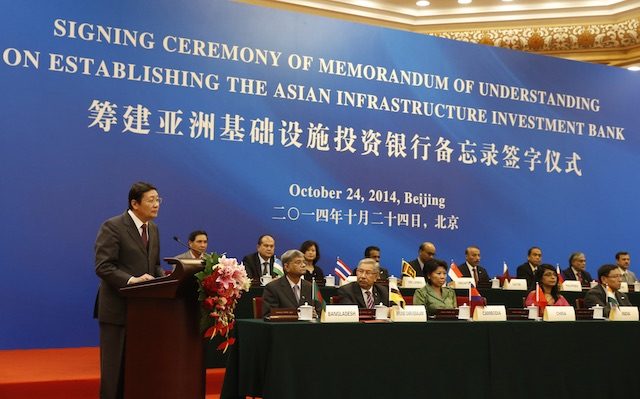SUMMARY
This is AI generated summarization, which may have errors. For context, always refer to the full article.

While the high-level Philippine delegation went to The Hague for the oral hearings on the Philippine international arbitration case against China on 7-13 July 2015, one issue left behind in Philippines-China relations was the Philippine’s participation in the Asian Infrastructure Investment Bank (AIIB). The AIIB is China’s version of the American-led World Bank and the Japan-led Asian Development Bank (ADB).
Though welcomed by many members of the international community, the AIIB continues to raise suspicions of some countries in Southeast Asia. The Philippines, particularly, deferred the signing of AIIB’s Articles of Agreement (AOA) when it was officially opened for accession on 29 June 2015.
The Philippine government earlier expressed its strong interest to join the AIIB when President Xi Jinping proposed it in October 2013. But Manila has currently become very cautious of joining the AIIB because of its lingering suspicions of China’s overarching strategic intentions as a gigantic neighbor involved in complex territorial disputes in the West Philippine Sea (WPS). (READ: Why PH is not yet joining the China-led infra bank)
With an initial fund of $100 billion, there is no doubt that the AIIB is a tempting financial offer to the Philippines considering its huge infrastructure requirements.
But Manila is not yet ready to join this “new financial entity” because of its enormous security baggage associated with China’s rapid rise as a world power with on-going territorial and maritime conflicts with the Philippines. (READ: Aquino: PH still mulling AIIB invitation)
First, the Philippine government is not yet comfortable to be part of the AIIB because of its current international arbitration case with China.
The International Arbitral Tribunal has started its oral hearings on jurisdictional issues of the Philippine case against China. It was very awkward for the Philippine government to sign the AOA while it was rigorously preparing for its oral arguments against Beijing’s “excessive claim” in the South China Sea. It is not very prudent to borrow money from a neighbor whom you just sued for some reasons. Not joining the AIIB at the moment is a tactical move of the current Philippine administration to save its beleaguered face amidst the international arbitration case against China. (READ: PH to Hague tribunal: China threatens law of the sea)
Even on the part of China, it is utterly difficult to lend money to a neighbor with a pending legal case against you. The loan can be perceived as a subtle bribe to go easy on the case, if not to totally withdraw it.
The Philippines, in fact, is giving China a big favor when Manila decides to defer its accession to the AIIB. The Philippines is saving China from its current dilemma on how to deal with the Philippines considering the on-going international arbitration case. The case truly hurts the sensitivity of China not only as a claimant state, but also as an ascendant world power that has a grandiose dream to rejuvenate its nation after a century of global humiliation. (READ: EXPLAINER: Philippines’ 5 arguments vs China)
Second, the Philippines is enhancing its defense alliance with the United States (US) in the light of prevailing security situation in the Asia Pacific, in general, and in the South China Sea, in particular. The Philippine government has, in fact, signed the Enhanced Defense Cooperation Agreement (EDCA) with the US last year to reaffirm the importance of their existing security alliance to implement the American rebalance strategy in Asia, which Beijing perceives as a containment strategy.
With EDCA, Manila expects the Pentagon to provide its “little brown brother” in Asia the needed security assistance, particularly in the context of rising security tensions in the South China Sea.

Thus, it is ungrateful for the Philippines to join the AIIB at the moment considering that the US has expressed opposition to the establishment of this new financial entity.
The AIIB not only challenges the credibility and reliability of the World Bank led by the US. Being led by China, the AIIB also challenges the existing global power structure currently ruled by the US.
The AIIB is a reflection of China’s global power transition. The AIIB reveals the heightening of US-China major power rivalry. In the midst of this major power rivalry, the Philippines has currently opted to be on the side of its erstwhile colonial master, the US. (READ: The Asian Infrastructure Investment Bank: Considerations for the Philippines)
Though other American security allies, like Australia and South Korea, have joined the AIIB, the Philippines does not have the same political and economic leverage that these other allies have.
If the truth be known, the Philippines is the most subservient American security ally in Asia. The Philippines is the most dependent American security ally because of a wide array of reasons: historical, cultural, psychological, political, economic and strategic.
Joining the AIIB will be a great paradigm shift in Philippine foreign and security policy – a shift that former President Gloria Macapagal Arroyo enjoyed during her term and suffered after that. (READ: Why China prefers Arroyo over Aquino)
Finally, the present Philippine government has not yet recovered from its bad experiences with China’s loan facilities, particularly in connection with the North Rail Project amounting to $11.5 billion and ZTE Broadband Project amounting to $329 million. These projects were associated with corruption scandals involving China’s firms and top Filipino government officials of the previous administration. The Philippines is very wary of accepting loans from China because of lessons learned from previous projects.
From economic standpoints, the AIIB offers many opportunities for the Philippines to meet its many infrastructure needs requiring huge financial support.
But Philippine participation in the AIIB is not only dictated by economic imperatives. It is largely influenced by political and security concerns associated with the international arbitration case, Philippine-American security alliance, and bad experiences with the outcome of China’s development aid.
In January 2016, the Philippine government expects the International Arbitral Tribunal to issue its award on the Philippine case versus China on the South China Sea disputes. Philippine accession to the AIIB will be heavily influenced by the outcome of the arbitration case.
Unless the Philippine government musters enough courage to defy the will of its American ally opposing the AIIB, it will be odd for the Philippines to be part of a China-led global financial project. The Philippine government has to develop its skills to get the best of both powers and not just to be torn between two lovers.
Finally, unless the Philippine government learns how to move on with the bad experiences with China, its decision to participate in the AIIB will be continuously haunted by the ghosts of the past.
There is no doubt that AIIB sounds good. But will it work to advance Philippine security?
Answering this question will be a great challenge to the next Philippine administration in 2016. – Rappler.com
Rommel C. Banlaoi is a Senior Faculty at the Department of International Studies, Miriam College, the Philippines. He is also the Director of the Center for Intelligence and National Security Studies (CINSS) of the Philippine Institute for Peace, Violence and Terrorism Research (PIPVTR) and currently the Vice President of the Philippine Association for Chinese Studies (PACS).
Add a comment
How does this make you feel?
There are no comments yet. Add your comment to start the conversation.